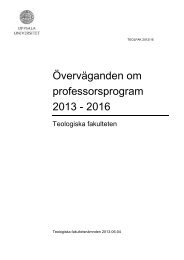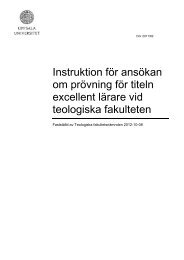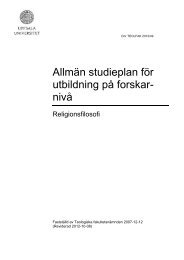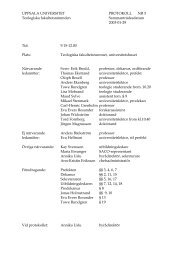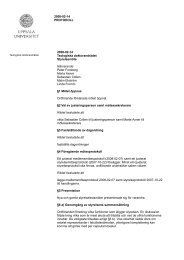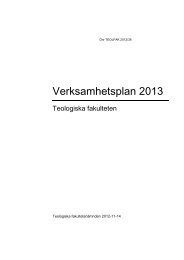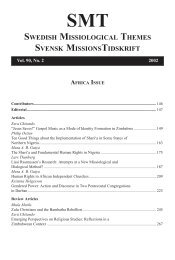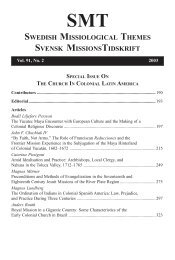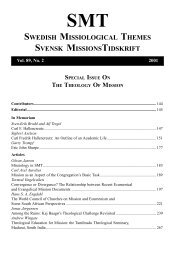SWEDISH MISSIOLOGICAL THEMES SVENSK MISSIONSTIDSKRIFT
SWEDISH MISSIOLOGICAL THEMES SVENSK MISSIONSTIDSKRIFT
SWEDISH MISSIOLOGICAL THEMES SVENSK MISSIONSTIDSKRIFT
You also want an ePaper? Increase the reach of your titles
YUMPU automatically turns print PDFs into web optimized ePapers that Google loves.
516 Aasulv Lande<br />
In other words it is the mission command in Matthew 28 and in addition a<br />
threefold diaconal service: for the individual, for society and for nature.<br />
The Church of England’s five marks of mission illustrates that God’s mission<br />
needs a simple and pedagogical rephrasing in today’s post-modern and<br />
post-industrial world. I am inclined to pointing to another dimension that<br />
has been in the focus for mission today – and over the whole world:<br />
reconciliation. That word sums up many aspects of mission and it has been<br />
important in ecumenical thinking. If we consider the challenge for Christians<br />
in countries such as South Africa and those in Central Africa, reconciliation<br />
has been vital. The South African Truth and Reconciliation Commission<br />
has become a model for such work and for a central feature of mission. If<br />
we take a look at today’s pluralistic Europe we understand that reconciliation<br />
based on truth and righteousness is part of the challenge for mission. In a<br />
way this is the Christian response to post-modernity that wants to<br />
fragmentise everything into atoms. Christian mission will build bridges<br />
between what has broken apart and connect isolated islands. It is a difficult<br />
and painful task that also can include confrontations. But the five marks of<br />
mission seek and need an overall goal and agenda – and we can find it in<br />
the eschatological service for reconciliation that the fragmented post-modern<br />
world is yearning for. 20<br />
It is also a question of developing a respect for the human being and the<br />
environment that in different ways seek and relate to God. We are called to<br />
listen to people with their experiences of life and God and their search for<br />
truth in their lives and their religious heritage and our witness. During the<br />
ecumenical decade “Churches in solidarity with women” 1988-1998, the<br />
focus was on sex and gender. Today, we have moved to considering<br />
reconciliation and solidarity with oppressed, as both related to sex and<br />
gender, and race and social class around the world. This solidarity aims at<br />
reconciliation and is an important aspect of mission today.<br />
We should also not forget the subject of mission. In other words, co-working<br />
both inside and outside the Christian Church with other groups. What about<br />
building reconciliatory communion with different religious groups? Is that<br />
not also what mission calls us to today? The interreligious and intercultural<br />
dialogue is of utmost importance for Christian missionaries (modern<br />
20 Eph. 2,11-18



